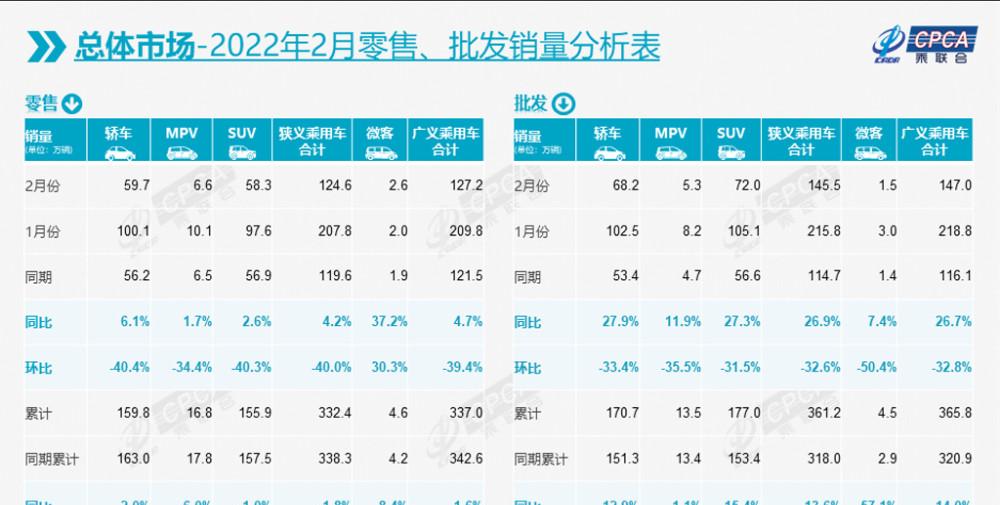On March 8, the Association released the national passenger car production and sales data for February. According to the data, domestic passenger car retail sales in February were 1.246 million units, an increase of 4.2% year-on-year, but down 40% month-on-month.

Among them, the sales of independent brands reached 540,000 units in February, an increase of 14% year-on-year and a decrease of 42% month-on-month. Cui Dongshu, secretary general of the Association, said that due to the impact of price increases, orders for new energy vehicles were weak in late January, but recovered in February. Thanks to the continuous deepening of the new energy market, the market share of independent brands reached 44% in February, an increase of 4.3% year-on-year.
In terms of joint venture import brands, the sales volume of the main brand is about the same as that of the independent brand, the mainstream brand sales are 550,000 units, and the Japanese and Ashkenazi brands are still the main participants in the joint venture battlefield, with retail sales of 23.1% and 20.5% respectively.
The penetration rate of new energy passenger cars of independent brands is as high as 41.9%
In February this year, the retail sales of new energy passenger cars reached 272,000 units, up 180.5% year-on-year and down 22.6% month-on-month, and the retail penetration rate reached 21.8%, an increase of 13.7% year-on-year. Among them, the penetration rate of new energy passenger cars of Chinese brands is as high as 41.9%, and the penetration rate of new energy vehicles in luxury cars is 17.4%, while the penetration rate of mainstream foreign brands is only 3.5%.
Specific to the brand, BYD still maintains the top position in new energy brand sales, with sales reaching 87,473 units in February; Tesla is close behind, with sales of 56,515 vehicles in the month; SAIC-GM-Wuling sales of 26,046 vehicles, ranking third. In addition, Geely Automobile and Chery Automobile achieved sales of more than 10,000 units in a single month with sales of 14,285 units and 10,271 units, respectively. The sales performance of several major automobile groups has also greatly contributed to the market share of its own brands.
Affected by the Spring Festival holiday, the sales of new car-making forces in February exceeded 10,000, down about 30%-60% from January sales. Among them, the ideal car delivered 8414 vehicles ranked first, the "dark horse" Nezha car delivered 7117 vehicles, ranking second, and Xiaopeng Automobile ranked third with 6225 vehicles per month, compared with the 12922 vehicles in January.
Among the mainstream joint venture brands, North-South Volkswagen's new energy vehicles are wholesaled to 11,916 units, accounting for 58% of the mainstream joint venture shares, becoming the sales force in this field.
For the sales volume of the new energy market in March, the Association predicts that consumers' acceptance of new energy vehicle prices will recover after the Spring Festival, and there are still backlogs of undelivered orders in the early stage, so the sales of new energy models in March will not be affected by the decline.
After releasing the national passenger car production and sales data in February, Cui Dongshu responded to some hot topics in the auto market and responded to Blue Whale Motors.
Oil prices hit a new high in nearly 10 years, and the self-owned brand plug-in and mixed models ushered in the spring?
Since March this year, domestic oil prices have continued to rise, setting a new price record in the past 10 years, and fuel vehicles, especially joint venture brand models, will encounter sales challenges from their own brands in the Chinese market. Cui Dongshu believes that the plug-in hybrid model has advantages in the cost of use and the right of way, and in recent years, car companies such as BYD, Geely, and Great Wall have been fully deployed on the plug-in and mixed models, and there may be a development trend to replace the joint venture brand. Last year, the market share of mainland plug-in and hybrid models was only 18%, and this year, the federation judged that the proportion of this market will increase to 25%.
The collective price increase of new energy vehicles affects sales?
Since the beginning of this year, trapped by the decline of subsidies and the rise of raw materials, many car companies have adjusted the prices of their new energy models, especially the lower-priceD A00-class models. In this regard, Cui Dongshu said that consumers can maintain an acceptable attitude towards rising prices, in addition, under the influence of the epidemic, most of them are just needed cars, and in the first two months of this year, the sales of new energy vehicles increased by 150% year-on-year. At present, new energy orders are relatively stable, and the price increase will not affect the overall sales target.
Does the chip shortage put cost pressure on joint venture brands?
Chip shortage has been bringing huge production pressure to car companies, last year's chip gap reached 20%-30%, this year is expected to ease the chip supply, the federation will predict that the gap or down to 10%. Cui Dongshu told Blue Whale Automobile that the joint venture has been relatively accurate in its production and market forecasts and market judgments, and the previous capacity pressure was caused by the uneven distribution of chips to its subordinate joint venture brands, and this situation will be alleviated this year.
"Wei Xiaoli" gathered in Hong Kong stocks, just for capital?
On March 10, NIO will go to Hong Kong for listing, and "Wei Xiaoli" will gather in Hong Kong stocks to achieve the secondary listing of new forces. Cui Dongshu believes that on the one hand, "Wei Xiaoli" can get rid of the constraints of us stocks, and listing in Hong Kong will receive more stable capital support; on the other hand, going to Hong Kong to a certain extent positively guides its brand image and can form a better advertising effect.